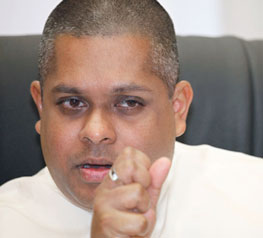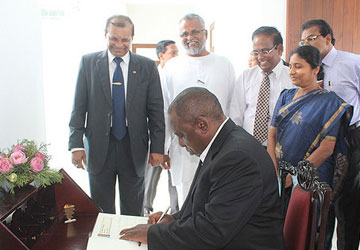Ramaphosa visit:

Sunday, 13th July 2014
By Manjula Fernando

The South African delegation led by Deputy President Cyril Ramaphosa was in Sri Lanka on a two-day work visit.
He toured the country last Monday and Tuesday on the invitation of President Mahinda Rajapaksa.
During his stay which was received with mixed reactions, Ramaphosa held talks with the President and members of the opposition including TNA leader, R. Sampanthan and Opposition Leader Ranil Wickremasinghe.
While in Jaffna he met the Northern province Governor Maj.Gen.(Rtd) G.A.Chandrasiri and Chief Minister C.V.Vigneswaran.
External Affairs Deputy Minister Neomal Perera in Parliament on Thursday clarified that Ramaphosa's visit had been undertaken with a view to sharing views on the Truth and Reconciliation Commission(TRC) to explore the possibility of Sri Lanka adopting a mechanism similar to South Africa's Truth and Reconciliation Commission.
He shot down speculation that the South African envoy or South Africa is being considered as a mediator for talks between the Government and the TNA.
In this backdrop the Sunday Observer had a Question and Answer session with the External Affairs Ministry Monitoring MP Sajin De Vaas Gunewardena on the purpose of the South African top envoy's visit to Lanka.
MP Gunewardena was a member of the Sri Lankan delegation to Cape Town in February this year, led by Minister Nimal Siripala de Silva.
The Sri Lankan team comprising, Traditional Industries and Small Enterprise Development Minister Douglas Devananda, Deputy Minister of Investment Promotion Faiszer Musthapha and Organizer of the SLFP for the Batticaloa District Arun Thambimuttu, toured the country soon after the appointment of Ramaphosa as the special envoy to Sri Lanka by South African President Jacob Zuma.
Q: What was the purpose of the South African Deputy President's visit to Sri Lanka this week?
A: The primary purpose was to impart their knowledge on the Truth and Reconciliation Commission(TRC) work that was undertaken in the South African context and to see how best Sri Lanka could also share the experiences and see whether there are commonalities for us to learn from.
This was based on our request as it is important for us to study similar models when we talk about what is good for Sri Lanka, to know how others have achieved this.
Q: Can we adopt a truth commission style reconciliation process in Sri Lanka and is there on-going effort to initiate such a process?
A:To know whether there can be adaptability in some contexts we need to study and see.
That is what we are doing right now.
Q: Whom did he meet and what was the focus of his discussions with different stakeholders, especially the TNA and the Opposition leader?
A: From what I gather the importance of the TNA and UNP participating in the Select Committee Process would have figured in their discussions.
As I was not present at those meetings I cannot comment any further. It is evidently clear that if these two parties participate in the Parliamentary Select Committee (PSC) process in Parliament, the issues can be resolved easily.
Q: The TNA which had been dragging their feet on the PSC chaired by Minister Nimal Siripala De Silva was quick to welcome the visit of Ramaphosa and say that they were eager to meet him. Do you think this is a good sign that the TNA is finally willing to take part in some kind of a negotiating process to resolve issues faced by the Northern Tamils?
A: Personally I do not think the TNA is willing to participate in any process. They have too much division within themselves and no proper leadership currently.
I think they are also like the UNP now “Governed by so many but decisions taken by nobody”.
If the TNA wants to participate in any process, any single process this would most certainly be a good sign. Let us wait and see.
Q: Certain quarters including some constituent parties of the ruling UPFA such as the JHU and the NFF, criticised the South African involvement in Sri Lanka's reconciliation process saying their model is alien to Sri Lanka and not compatible with its ground realities. Your comments?
A: As I said before, to know whether there is suitability or not one has to study it and understand whether there is relevance and or parallels that we can draw to suite our requirements, this is what is being done.
Q: It is alleged the LTTE diaspora and their sympathisers constitute an influential population in South Africa. Some claim the TNA is behind the involvement of South Africa as a mediator. What's your take on these allegations?
A: Mediation cannot be done single handedly. The Government of Sri Lanka (GOSL) also must agree if this is so.
The GOSL has had no discussions on these lines at all.

Deputy South African President Cyril Ramaphosa signs the Visitors Book on his recent visit to the North
Q: Did he make any comments after the visit to the North ? Was he impressed with the development, resettlement and demining in the war affected areas?
A: Absolutely. When taking into consideration the colossal amount of work that has been carried out in every sphere, they were very impressed. The investment, funding done and the results achieved in a such a short term, no country in the world, after a conflict of such brutality, has ever achieved.
Q: Will there be a follow up to the visit of Ramaphosa from the Sri Lankan side, such as a Sri Lankan team undertaking another visit to Cape Town shortly?
A: It is too early to comment on such a probability.
Q: Was there an outcome report to the previous visit?
A: It is a process where we are studying the similarities, therefore it is too premature for an outcome report.
Q: Why have we invited South Africa to assist us in our reconciliation process, is it because the on-going domestic process is malformed or lacking international support?
A: As I said before their TRC is a good model for us to study on how they achieved reconciliation. Under the leadership of the late Nelson Mandela they achieved an almost perfect reconciliation in that country. This is no easy task. Even in the Sri Lankan context matters may be even more complicated as what we have to achieve is reconciliation between different ethnic groups, and the South African situation basically revolved around minorities oppressing minorities. Let us study it.
The challenges and remedies required in most cases irrespective of the form of the conflict at times are the same.
Q: Has the international community responded positively to South Africa's involvement in Sri Lanka ?
A: It is my experience that the international community only responds when they have an agenda to seek. When something good takes place they are generally silent.
From: http://www.sundayobserver.lk/2014/07/13/pol03.asp




